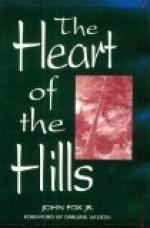“Watch out thar!” he called, sharply.
Her cork bobbed, sank, and when, with closed eyes, she jerked with all her might, a big shining chub rose from the water and landed on the bank beside her. She gave a subdued squeal of joy, but the boy’s face was calm as a star. Minnows like that were all right for a girl to catch and even for him to eat, but he was after game for a man. A moment later he heard another jerk and another fish was flopping on the bank, and this time she made no sound, but only flashed her triumphant eyes upon him. At the third fish, she turned her eyes for approval—and got none; and at the fourth, she did not look up at all, for he was walking toward her.
“You air skeerin’ the big uns,” he said shortly, and as he passed he pulled his Barlow knife from his pocket and dropped it at her feet. She rose obediently, and with no sign of protest began gathering an apronful of twigs and piling them for a fire. Then she began scraping one of the fish, and when it was cleaned she lighted the fire. The blaze crackled merrily, the blue smoke rose like some joyous spirit loosed for upward flight, and by the time the fourth fish was cleaned, a little bed of winking coals was ready and soon a gentle sizzling assailed the boy’s ears, and a scent made his nostrils quiver and set his stomach a-hungering. But still he gave no sign of interest—even when the little girl spoke at last:
“Dinner’s ready.”
He did not look around, for he had crouched, his body taut from head to foot, and he might have been turned suddenly to stone for all the sign of life he gave, and the little girl too was just as motionless. Then she saw the little statue come slowly back to quivering life. She saw the bow bend, the shaft of the arrow drawing close to the boy’s paling cheek, there was a rushing hiss through the air, a burning hiss in the water, a mighty bass leaped from the convulsed surface and shot to the depths again, leaving the headless arrow afloat. The boy gave one sharp cry and lapsed into his stolid calm again.
The little girl said nothing, for there is no balm for the tragedy of the big fish that gets away. Slowly he untied the string from his reddened wrist and pulled the arrow in. Slowly he turned and gazed indifferently at the four crisp fish on four dry twigs with four pieces of corn pone lying on the grass near them, and the little girl squatting meekly and waiting, as the woman should for her working lord. With his Barlow knife he slowly speared a corn pone, picking up a fish with the other hand, and still she waited until he spoke.
“Take out, Mavie,” he said with great gravity and condescension, and then his knife with a generous mouthful on its point stopped in the air, his startled eyes widened, and the little girl shrank cowering behind him. A heavy footfall had crunched on the quiet air, the bushes had parted, and a huge mountaineer towered above them with a Winchester over his shoulder and a kindly smile under his heavy beard. The boy was startled—not frightened.




